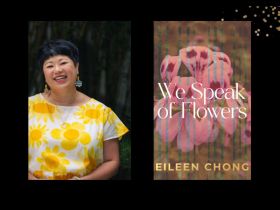Nick Earls talks novellas in Out of the Box at Perth Writers Festival 2017.
The first session at Perth Writers Festival, Out of the Box, was about the unconventional in writing. It was unfortunate that Alejandro Zambra, Chilean author of the experimental novel Multiple Choice (Penguin Random House, 2016), could not be present. But there was compensation aplenty when facilitator Susan Midalia spoke to Nick Earls about his ‘five richly intelligent novellas that make up Wisdom Tree (Inkerman and Blunt, 2016), and about his mission to bring the novella back.
Why the novella? Earls recognised early on that he could not do justice to his stories if they were short. But he agreed with Midalia that size is not all that makes a novella. Attentiveness has a role in distinguishing this genre from the novel or short story. It requires a different kind of focus. ‘When done well’, he told us, it ‘goes deep without going long’.
What impressed in this session was the way our understanding of the novella came not from any simple definition, but from the discussions that dipped in and out of such topics as character, the main ideas, and the power of perspective. Earls told how his five novellas are interlinked through a few common threads. An important theme is the interconnection between people. This takes precedence over celebrity and other superficial values. To arrive at that realisation the characters have to leave their comfort zone, often even physically, and that’s where place (the titles are all place names) and travel enter the mix.
On the role of art and the artistic figure, as represented in Gotham, the first of the five books, Earls spoke of ‘the rapper phenomenology’. The character NA$TY BOI comes from poverty and cannot cope with his sudden fame and fortune. But Earls, as author and outsider, could not ‘get into his head’ and needed the added layer of the Australian narrator who tries to understand the rapper. That might be enough for a short story, but Earls felt that his second character should be ‘more than a vessel to get to NA$TY BOI’. He had to have a family, and there had to be a reason for them all to be in New York, something beyond the narrator’s work writing articles. Then, into the mix comes the unexpected, and it brings out the value of family and of relationships. This depth is what makes it a novella.
On the role of children in his novellas, Earls talked about the nature of childhood and told of how he took his own son to a famous New York toy store to see Iron Man and Spiderman. Earls was concerned about possible disappointment, but the boy’s heroes turned up and were everything the boy wished for, giving the lie to the doubting Thomas in Earls, the sensible adult and father.
Midalia suggested that it’s not only family, art, celebrity, and relationships that stand out in these stories, but also the many different angles and perspectives on the characters and events. She wondered if Earls ever wrote from the perspective of a female character. Not here, he replied. He wanted to look at ‘male Australia’ and he didn’t want to ‘add to the stretching’ already present in the novellas ‘by stretching the gender as well’. The different angles were a way of achieving the combination of intensity and expansiveness that is the strength of the novella; he wanted to strike the right balance. But there is Natalie, an artist character who brings her view of things to her art. This, he said, ‘metaphorically reflects what I’m trying to do with the novellas’.
Midalia sees in Earls’ work a form of realist fiction, which ‘gets a bad rap these days’, but it’s ‘hard to write good, memorable fiction’. Earls emphasised that he wants to ‘play against gimmicky’, and he wants ‘subtlety’. He also likes open endings – life works that way; besides, not everything ends at once. ‘My job is to enter the story as late as possible and exit as soon as the business is done.’
Earls spoke graciously about the absent guest. Alejandro Zambra’s Multiple Choice is experimental in its structure, being designed as a standardised test. Earls found it very interesting and ‘a great idea well executed’. In his own case, he said, it was the manner of publishing that broke the rules, not so much the writing. There followed a discussion of the length of books and the way some writers are paid by the number of words. Few of us would disagree with Earls’ view that we need to ‘shift the focus from price to value’. Perhaps the novella can help do that. Along with the audience, I cheered one of his closing statements: ‘We may buy books by the kilo, but we don’t love or remember them by the kilo’.
Rating: 4 stars out of 5
Out of the Box: featuring Nick Earls
Speakers: Susan Midalia talks to Nick Earls
Murdoch Lecture Theatre
Saturday 25 February 2017 10.00am
PIAF 2017





